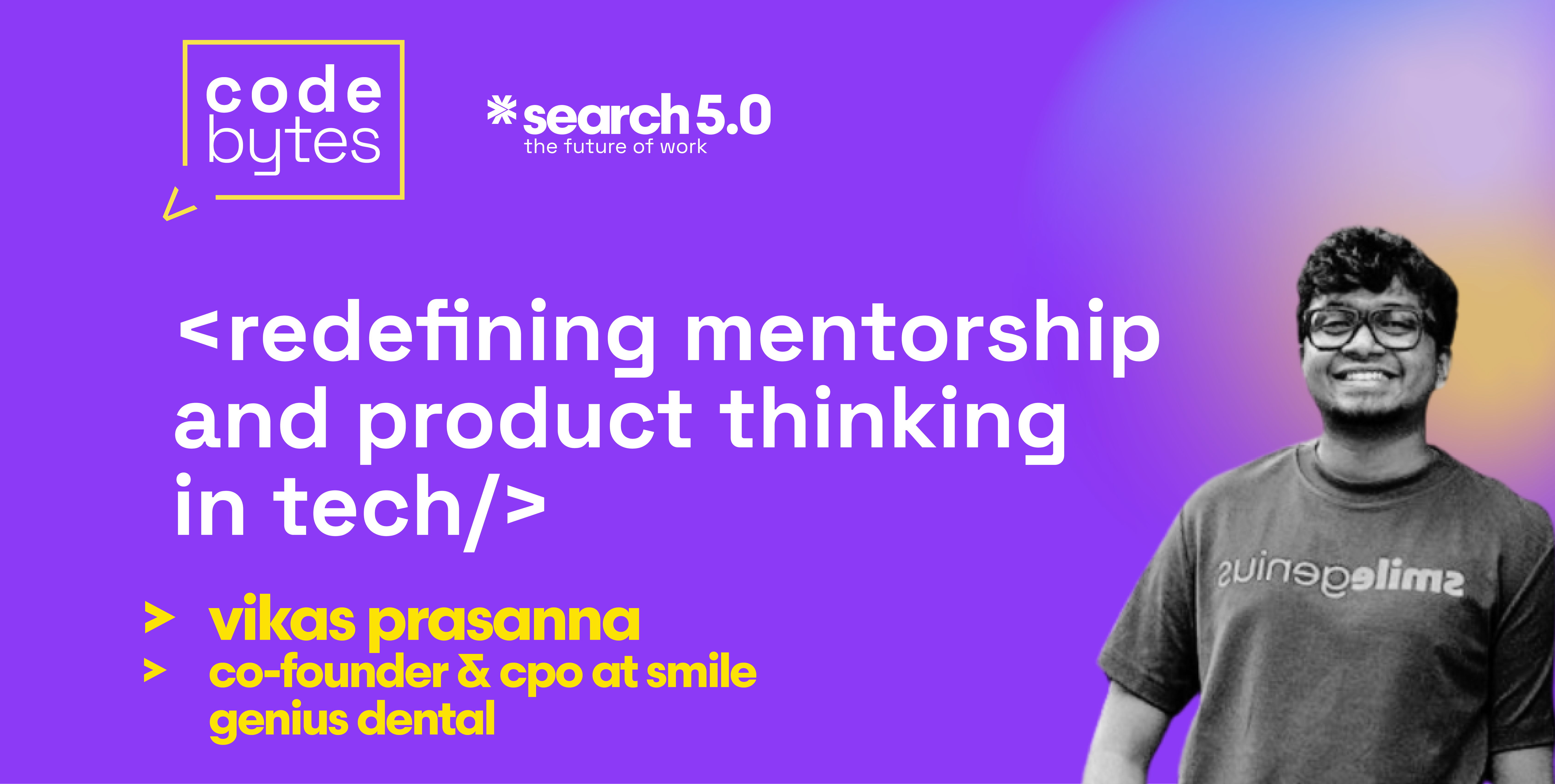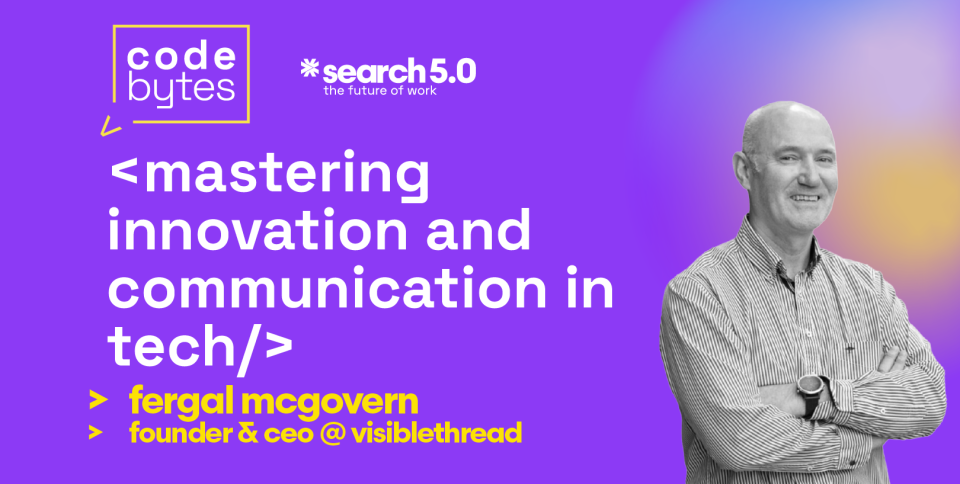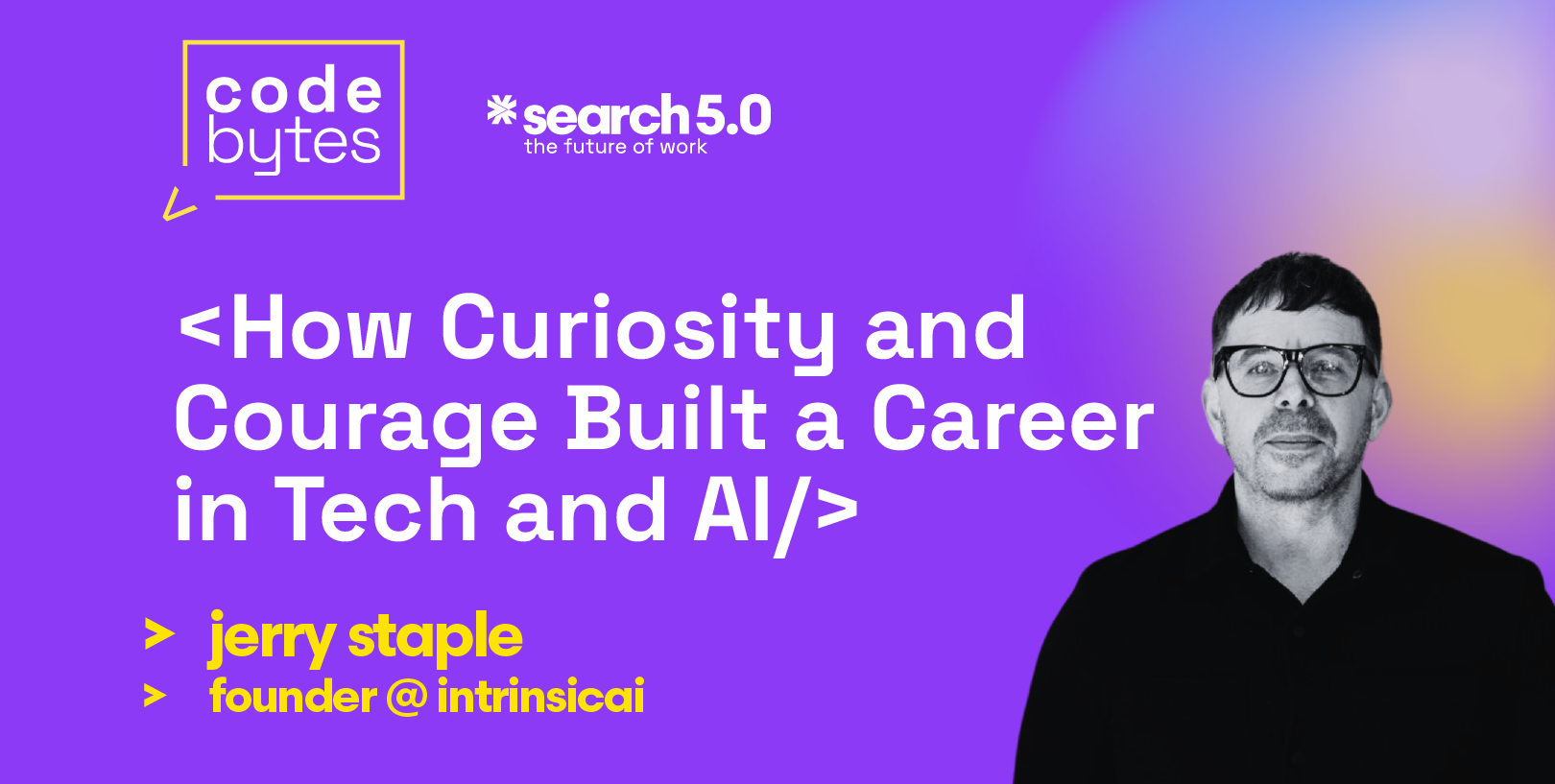
In the latest episode of the Code Bytes podcast, hosted by Stephen Turkington, we sit down with Fergal McGovern, CEO of VisibleThread, to explore a wide range of topics in the world of technology, leadership, and entrepreneurship. As the Co-Founder of VisibleThread, Fergal brings an incredible wealth of experience to the conversation, particularly in areas that are critical to the technology recruitment landscape. His journey, filled with pivotal moments and practical lessons, sheds light on what it takes to build a successful career in the tech industry today.
This episode is particularly valuable for professionals in technology recruitment in Northern Ireland, technology recruitment in the UK, and for those seeking to enter the ever-evolving field of technology. Fergal’s insights provide clarity for both job seekers and hiring managers who are navigating complex hiring landscapes, especially in specialised sectors such as software engineering, DevOps, data and AI, and infrastructure and support.
From Humble Beginnings to Global Opportunities: Finding Jobs in Technology
Fergal’s journey began after graduating with a computer science degree in the late 1980s. During that time, the Irish economy was in a challenging state, with unemployment reaching 22%. This economic downturn forced many young professionals, like Fergal, to seek opportunities abroad. He took his expertise to Japan and the United States, two markets that were booming with technological growth and innovation. This formative experience working with companies like Dell and Kraft Foods laid the groundwork for his eventual return to Ireland, where he would continue to shape the technology recruitment landscape, particularly for roles in product development, software engineering, and data and AI.
Fergal’s early career highlights a key lesson for today’s professionals: success in jobs in technology often comes from being adaptable and open to new experiences. For anyone looking to enter the technology sector, especially in today’s competitive job market, it’s crucial to be open to opportunities outside your home country, just as Fergal did in his early years. His willingness to explore roles in different cultural and technological contexts gave him a unique perspective that later shaped his entrepreneurial success.
Contract Roles in Technology: The Evolution of Leadership and Communication
In today’s conversation, Fergal highlights a pivotal shift in his career when he realised that being a strong communicator was just as important as being a capable technologist. This ability to connect with people, ask the right questions, and clarify expectations has been instrumental to his success, especially as he transitioned into leadership roles.
For those seeking contract roles in technology, particularly in DevOps, software engineering, or software testing, Fergal’s advice on communication is key. He learned early on that technical proficiency alone isn’t enough. You need to be able to articulate problems, ask for help, and collaborate effectively with diverse teams. This lesson is especially relevant for professionals working in contract roles where short-term projects often require rapid integration into new teams and fast-paced environments.
Fergal’s emphasis on communication also resonates in today’s technology recruitment in the UK, where hiring managers are increasingly looking for candidates who can not only code but also engage with clients, stakeholders, and colleagues across multiple departments. He mentions that good communication skills can be the deciding factor in whether or not a project succeeds, especially when it comes to understanding client needs and delivering software on time and on budget.
Software Engineering and the Power of Adaptability
One of the most insightful parts of the discussion centers around the lessons Fergal learned while working at Steel Trace, a company he co-founded and eventually sold in 2006. Steel Trace focused on requirements management—an area where Fergal noticed a significant gap in how software engineers and business stakeholders communicated about project needs.
This gap led him to develop software solutions that allowed for better storytelling and clearer communication about system requirements. The ability to articulate what the software needed to do became the foundation of Steel Trace’s success. This lesson remains incredibly relevant for today’s software engineering professionals. Having strong technical skills is essential, but being able to explain how those skills translate into business outcomes is what sets top talent apart in today’s tech industry.
For those working in software engineering or software testing, Fergal’s experience shows that adaptability and the ability to identify and solve communication breakdowns are invaluable. Whether you’re working in infrastructure and support, DevOps, or developing AI-driven products, being able to navigate these complex interpersonal dynamics can often mean the difference between success and failure.
As Fergal moved into the next phase of his career with VisibleThread, he applied the lessons learned from his previous ventures to address a fundamental issue: miscommunication in written documents. VisibleThread focuses on helping companies avoid costly mistakes in large-scale projects by using AI to automate the review of documents such as contracts and proposals.
This focus on transformation and change in how companies manage documentation is particularly relevant for today’s technology professionals. With so many businesses undergoing digital transformation, the need for accurate and efficient documentation is more critical than ever. Whether you’re working in data and AI, product management, or DevOps, having a clear understanding of how your work impacts the broader business goals can help you stand out in the highly competitive field of technology recruitment.
For hiring managers and recruiters in technology recruitment in Northern Ireland and across the UK, Fergal’s experience with VisibleThread provides a valuable case study in how automation and AI are reshaping traditional business processes. As more companies adopt AI-driven tools to streamline their operations, there’s a growing demand for professionals who can navigate these new technologies, making it an exciting time for those entering the field of technology recruitment.
Infrastructure and Support: The Backbone of Successful Tech Projects
Another critical aspect of the conversation focuses on infrastructure and support, the often-unsung heroes of any successful tech project. Fergal notes that in his early career, he learned firsthand the importance of building strong infrastructure systems that could support complex projects.
For professionals working in infrastructure and support, Fergal’s journey underscores the importance of having a solid foundation in both technical skills and communication. Whether you’re managing a team of developers or ensuring that the servers are running smoothly, being able to articulate your needs and concerns to the broader team is essential for success.
Fergal also touches on the importance of resilience and tenacity in the world of technology. He reminds listeners that the road to success is rarely smooth, and having the ability to stick with a project even when things go wrong is what separates great leaders from the rest. This message is particularly relevant for those working in infrastructure and support roles, where the pressure to keep systems running 24/7 can be intense.
The Role of Data and AI in Future-Proofing Your Career
As the conversation shifts towards the future of technology, Fergal highlights the growing importance of data and AIin today’s tech landscape. He discusses how AI tools, like those used at VisibleThread, are helping companies automate traditionally manual processes and identify potential risks in large-scale projects. This trend is not only transforming how companies operate but also creating new opportunities for professionals in technology recruitment who are looking to specialise in AI-driven roles.
For those interested in pursuing careers in data and AI, Fergal’s advice is clear: be open to learning new skills and adapting to the rapid pace of technological change. The demand for AI expertise is growing across multiple sectors, from software engineering to product management, and those who can navigate this complex field will be well-positioned for success in the coming years.
Fergal’s insights also provide a roadmap for recruiters in technology recruitment in Northern Ireland and the UK who are looking to place top talent in AI-driven roles. As more companies integrate AI into their business models, the demand for candidates with expertise in data and AI will only continue to grow, making this an exciting area for recruitment professionals to focus on.
Embracing the Future of Technology Recruitment
In this episode of Code Bytes, Fergal McGovern’s journey offers invaluable lessons for both job seekers and hiring managers in the tech industry. From his early days working abroad to founding successful companies, Fergal’s story is a testament to the power of adaptability, communication, and continuous learning.
For those navigating technology recruitment in the UK, Northern Ireland, or beyond, Fergal’s insights provide a blueprint for identifying top talent and building high-performing teams. Whether you’re looking for contract roles in technology, focusing on software engineering, or diving into the world of data and AI, this conversation offers practical advice and inspiration to help you succeed in today’s fast-paced tech landscape.




